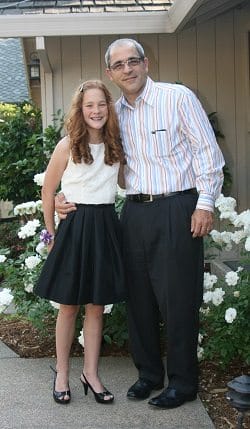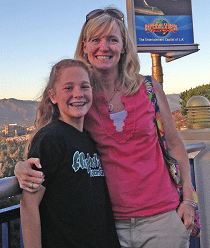In July 2013, Natalie Giorgi had a severe allergic reaction after taking a bite of a Rice Krispie square that turned out to contain peanut butter.
At first the 13-year-old had no obvious reaction, but soon she was suffering severe breathing distress and other signs of anaphylaxis. Natalie then died in her mother’s arms. It was the case that broke the hearts of her family – and of the entire food allergy community.
The family had been vacationing at Camp Sacramento, a family camp run by the city of Sacramento, whose staff had been fully informed of the girl’s allergies.
In October 2016, the lawsuit that Louis and Joanne Giorgi launched against the city was settled for $15 million as well as an agreement. That agreement states that Camp Sacramento will become accredited with the American Camping Association and implement full allergy training and accommodation protocols.
Natalie’s parents Louis and Joanne Giorgi said they had sued in part to ensure that what happened to Natalie would never happen again at the camp, and to raise awareness of the life-threatening nature of food allergies.
“For us, it was about that Natalie mattered, and she did nothing wrong,” Louis Giorgi, who is a physician, said in an interview with KCRA-TV, the local NBC affiliate. “And it was important for our kids to know that we did nothing wrong. Then, more globally, it was important to make sure that no other family was having to deal with this situation.”
Giorgis Find Solace in Awareness
Louis Giorgi believes the high profile of Natalie’s tragedy and lawsuit have sparked greater awareness of food allergies in general, and especially among those preparing meals. “For that, we find some solace in her loss, in that she will be there for others – countless others.”
The lawsuit accused the city of Sacramento and the camp of negligence in the hiring, training and supervising of staff who were to be serving campers with food allergies. After Natalie’s two epinephrine injections failed to stop her reaction from progressing, the camp’s staff were unable to locate the key to the cabinet that contained medicines, including an epinephrine auto-injector. Louis Giorgi severed a tendon breaking into the cabinet. The family’s suit said the missing key caused delay, which may have contributed to Natalie’s death.
In what the family’s lawyer referred to as the “cascading effect of this loss,” Louis Giorgi also can no longer work as a urological surgeon because of the injury sustained in breaking into the cabinet.
In a statement, the city’s spokesperson said: “The City and Camp Sacramento embrace the opportunity to make the appropriate changes to do all we can to protect our campers in the future such that a tragedy like this is not repeated.”
Club No One Wants to Join
Joanne Giorgi noted that in losing a child, she and her husband have “become part of the club that nobody wants to join.” At a press conference, and in reference to the significant settlement, she simply said: “Nothing makes this easier, even three years later. But it does actually allow us to know that we are doing good in our daughter’s name, and that carries her memory on.”
In the interview with KCRA, the Giorgis said the settlement closes a chapter, but their family’s healing process continues. Louis Giorgi said: “The lawsuit is over. But the reality is that Natalie should have driven to high school with her twin sister and her little sister today.”
The Giorgis started the Natalie Giorgi Sunshine Foundation to spread food allergy awareness. In one example, Joanne also gave powerful testimony for a California bill that requires public schools to keep stock epinephrine auto-injectors available in case of a reaction emergency. That bill is now law.
Related Reading:
Lessons from a Teen Food Allergy Tragedy
2014 Q&A with Natalie Giorgi’s Parents







